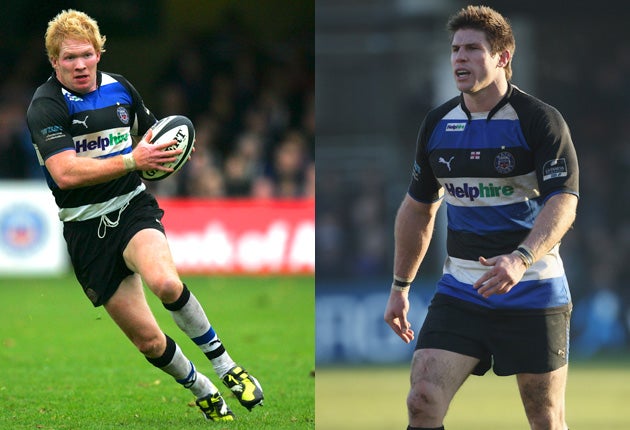Bath pair lose drugs appeal
Nine-month bans upheld for Crockett and Lipman after missed drugs tests

Eight difficult months after concrete evidence first emerged of a problem with substance abuse and related issues at Bath – and, indeed, English rugby at large – the West Country club finally achieved a degree of closure yesterday when two senior players, the international flanker Michael Lipman and the centre Alex Crockett, lost their appeals against nine-month bans imposed by a disciplinary tribunal in August.
Lipman and Crockett, suspended for missing drugs tests at the end of last season, will not be seen on a pitch until the end of February at the earliest.
Neither player attended the appeal hearing in London, leaving it to their legal team to argue that Bath officials acted outside their remit in pressing them to take the tests. There were also claims that the players had "reasonable excuses" for not participating and that their behaviour was not prejudicial to the interests of the game. This approach did not impress the new three-man panel, who took less than two hours to find in favour of the original judgement.
Chaired by the lawyer Matthew Lohn, who is also a qualified doctor and sits on the United Kingdom's new National Anti-Doping Panel, the tribunal said the club acted in an "entirely reasonable" fashion in asking Lipman and Crockett – along with a third member of the squad, the wing Andrew Higgins, who has since retired from the sport – to submit to testing, irrespective of what may or may not have been written in the players' contracts.
For their part, Bath expressed satisfaction that their actions had been upheld by the Rugby Football Union. The former European champions now believe they can move on from a painful episode that cost them the services of five players: the England prop Matt Stevens, who admitted to a cocaine habit after testing positive for the substance after a Heineken Cup game in Glasgow and is now serving a two-year suspension; Justin Harrison, the Wallaby lock who confessed to taking the same drug at an end-of-season party in London and was banned for eight months; and the three players – Lipman, Crockett and Higgins – who resigned from the club during the furore over the missed tests.
It is highly likely that both Lipman, currently thought to be in Australia, and Crockett will play Premiership rugby again. The 29-year-old Lipman is rated among the most effective breakaway forwards in the English game while Crockett, at 27, has five good years left in him.
Stevens certainly intends to return to rugby when his ban expires in 2011, although it remains to be seen whether he can work his way back to Test level. Meanwhile, there are strong rumours around Bath that Higgins may come out of retirement to play abroad.
Harlequins, the club who knocked Bath off the back pages during the summer as a result of the so-called "Bloodgate" affair, will make another of their regular appearances before a disciplinary tribunal tonight, this time representing their lock George Robson, who set a new record of sorts at Twickenham last Saturday by being sent off for butting inside 40 seconds.
Quins also expect to receive the latest bulletin from the "Bloodgate" investigation. The board of European Rugby Cup, which runs the Heineken Cup and have been investigating the Londoners' touchline chicanery during last season's quarter-final against Leinster, will re-open discussion on the club's future in European competition, taking into account the full details of the elaborate cover-up staged in the weeks following the now notorious incident.
Join our commenting forum
Join thought-provoking conversations, follow other Independent readers and see their replies
Comments
Bookmark popover
Removed from bookmarks